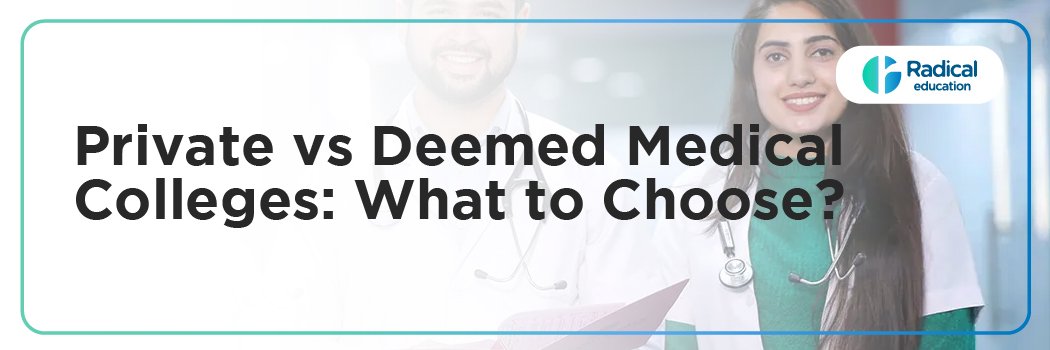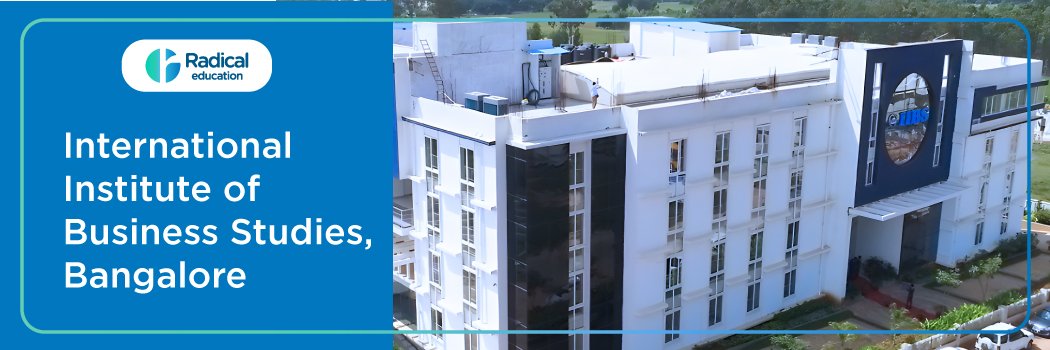

Private vs Deemed Medical Colleges: What to Choose?
Choosing between a private and a deemed medical college can be confusing, especially when both seem to offer similar opportunities on the surface. Private vs Deemed Medical Colleges As an MBBS aspirant who has appeared for NEET UG examination, you might be wondering—which one is better for your future? The truth is, each has its own pros and cons when it comes to fees, campus life, teaching style, and recognition. In this article, we’ll break down the real differences in a simple way to help you figure out which path fits you best. Let’s make your decision a little easier!
Private Medical Colleges
A Private Medical College is a private institution providing medical education which is affiliated with a state or national university. These colleges offer undergraduate and postgraduate medical degrees and follow some guidelines which set by the National Medical Commission.
Features of Private Medical Colleges
- They are operated by individuals, trusts, or foundations, rather than the government.
- Private medical colleges have higher tuition fees than government institutions.
- Some private colleges give better facilities, smaller class sizes and specialized training opportunities.
- Admission to most private medical colleges in India is through the National Eligibility cum Entrance Test.
- India has 320 private medical colleges, offering around 53,256 MBBS seats
Deemed Medical Colleges
Deemed medical colleges in India are private institutions which have been granted the status of “deemed to be universities” by the University Grants Commission. These colleges have a flexible approach to medical education and are known for their high standards of education, infrastructure, and research facilities.

Advantages of Deemed Medical Colleges over Private
- Deemed medical colleges typically have higher tuition fees than government or some private medical colleges.
- Their medical programs are still recognized and regulated by the National Medical Commission
- They have flexibility in their academic structure compared to government medical colleges
- Many deemed universities have strong research centers and encourage students to participate in research projects.
- Deemed universities may attract a more diverse student population compared to government colleges.
- They have strong ties with hospitals and other healthcare organizations, providing students with valuable clinical exposure.
Disadvantages of private medical colleges in India
- Private medical colleges typically have significantly higher tuition fees compared to government colleges
- The quality of education, infrastructure, and clinical exposure can vary significantly between private medical colleges.
- Private medical colleges have a higher proportion of students from affluent backgrounds
- Private colleges give priority to revenue generation over the quality of education.
NMC rules for deemed universities in India
- Deemed universities need to meet specific infrastructure standards, including land area, building facilities,
- Deemed universities must be listed on the NMC’s official website to legally offer MBBS
- Deemed universities must adhere to the eligibility criteria set by the NMC for MBBS admissions,
- The NMC has guidelines for determining fees in private medical colleges,
- The NMC mandates common counseling for postgraduate medical admissions across all medical institutions based on merit,
Best deemed medical colleges in India
- Kasturba Medical College (KMC), Manipal, Karnataka
- Kasturba Medical College (KMC), Mangalore
- Sri Ramachandra Institute of Higher Education and Research, Chennai, Tamil Nadu
- JSS Medical College Mysuru, Karnataka
- SRM Medical College Hospital and Research Centre, Chennai, Tamil Nadu
- Dr. D.Y. Patil Medical College, Pune Pune, Maharashtra
- Bharati Vidyapeeth Medical College Pune, Maharashtra
- Saveetha Medical College, Chennai, Tamil Nadu
Admission process for both Private and Deemed Universities
The admission process in Deemed and Private Medical Colleges is conducted through NEET UG counseling based on the scores obtained in NEET UG. Candidates who qualify the NEET UG exam must register on the MCC (Medical Counseling Committee) portal for Deemed Universities, while Private Medical College seats under state quotas are filled through respective state counseling authorities.
MBBS fees in deemed universities
- MBBS fees in deemed universities in India starts from ₹10 lakh to ₹25 lakh per year.
- Some of the top deemed universities charge more, and cost can go up to ₹1–1.25 crore for total course Package.
Difference between Private vs Deemed Medical Colleges
Private medical colleges are owned and managed by private organizations and are affiliated with a state or national university, while deemed medical universities are institutions granted university status by the University Grants Commission (UGC), granting them a higher degree of autonomy.
Private Medical Colleges
- It is affiliated with a state or national university.
- It is managed by private entities.
- It has limited autonomy, must adhere to the curriculum and guidelines of the affiliating university.
- Here, Degrees are awarded by the affiliating university.
- Fees are regulated by the State Fee Regulatory Authority.
Deemed Medical Colleges:
- Granted university status by the UGC, allowing them to award their own degrees.
- It possesses autonomy in curriculum design, admissions, and overall functioning.
- It operates independently, though they may be private or public in nature.
- These colleges award their own degrees, diplomas and certificates.
- It has a higher fee structure compared to private colleges, though private colleges can also be expensive.
- It works to attract highly qualified faculty and invest in advanced infrastructure.
How to choose between deemed and private medical colleges
Location
- The location of an institution is one of the desired factors in the race of choosing a college. It should be such that it will be near to your home state or in the state only.
- The proximity to home affects how and when you can visit family and friends and what will be the cost and convenience of travel.
- Small colleges can offer a more intimate sense of community that will let you build strong relationships with your friends and professors and colleges in large cities can grant you access to more social and cultural activities and provide you with internships with major companies and nonprofits.
Reputation
- College Reputation is very significant when choosing a college because it will help influence a student’s education and career.
- Graduates from well-known and prestigious colleges and universities will have a great alumni network, increased internship opportunities, and good salary packages. Majors and Programs
- Aligning the college choice with academic and career interests will help enhance the educational experience and will prepare students for better future careers.
- For example, if you know that you want to study art history, you should only consider schools that provide this degree.
- Specialized programs provide better networking opportunities, internships, and resources, which will be an extra advantage that help you to succeed in your chosen field. So, the selection of a college should be such that it will fulfill all your desires and needs.
Tuition and Fees
- Tuition and fees for different colleges depend on the type of college, course, and student in India.
Conclusion
In conclusion, it can be said that choosing between private and deemed medical colleges for MBBS totally depends on individual priorities. Private colleges provide more affordable options and are more accessible, while deemed universities may have better infrastructure and higher academic standards at a greater cost.

FAQ Related to Private vs Deemed Medical Colleges: What to Choose?
Which has better education quality – private or deemed?
Deemed universities have better infrastructure, faculty and research facilities.
Which one is more affordable?
Private medical colleges are said to be more affordable for state domicile students.
Is the degree from both valid for practice in India?
Yes, the degree from both is valid for practice in India.
Do deemed universities follow the same syllabus as private colleges?
Yes, but deemed universities have autonomy and provide more structured academic systems.
Which one has better national recognition?
Deemed universities rank higher in national rankings.
Do both have reservation policies?
Private colleges follow state reservation policies but deemed universities follow central government policies.
Which is better for PG entrance preparation?
Deemed colleges may provide better academic support.





